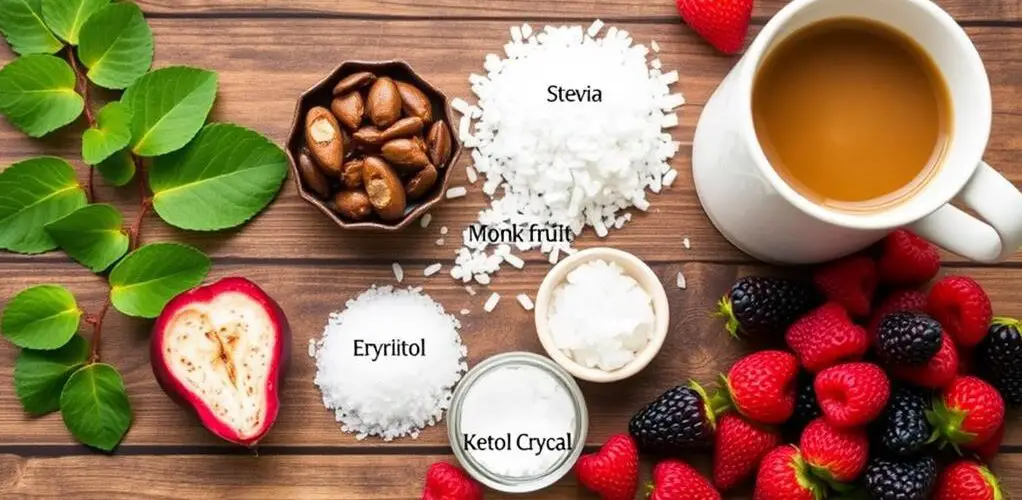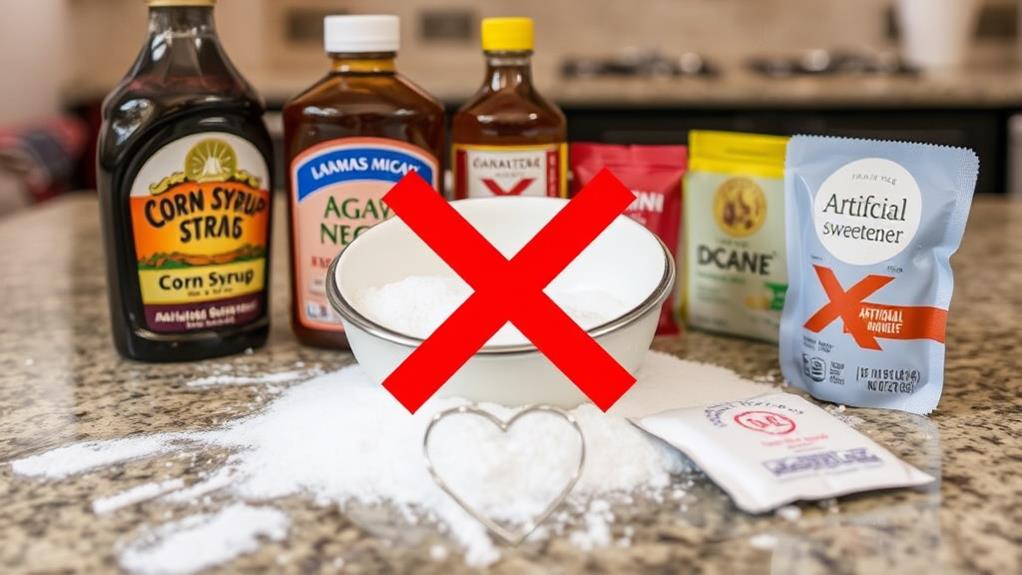
If you're following a keto diet but still crave something sweet, the best keto-friendly sweeteners include stevia, monk fruit, erythritol, and xylitol. Stevia and monk fruit are super sweet, zero-calorie options that won't mess with your blood sugar. Erythritol is nearly calorie-free and tastes like sugar, making it great for baking. Xylitol also works well but be careful because it can cause tummy troubles and is harmful to dogs. Avoid sweeteners like maltodextrin, honey, and agave nectar as they can knock you out of ketosis. Want the scoop on more tasty sweetener secrets? Stick around!
Key Takeaways
- Stevia is a zero-calorie sweetener that does not affect blood sugar levels and is 200-400 times sweeter than sugar.
- Monk fruit is a zero-carb sweetener with antioxidant properties, 100-250 times sweeter than sugar, suitable for various keto recipes.
- Erythritol has a glycemic index of 0, mimics sugar's taste and texture, and contains only 0.24 calories per gram.
- Xylitol is low-calorie, does not spike blood sugar, and benefits dental health, but can cause gastrointestinal issues if consumed excessively.
- Avoid maltodextrin, honey, coconut sugar, maple syrup, and agave nectar as they are high in carbs and disrupt ketosis.
Overview of Keto Sweeteners
Keto-friendly sweeteners are essential for those adhering to a ketogenic diet, as they provide a way to enjoy sweetness without disrupting ketosis. When you're into keto baking, choosing the right sweeteners is vital. Popular options include stevia, erythritol, monk fruit, and xylitol. These sweeteners are low-carb and won't mess with your blood sugar, keeping you in that sweet, sweet state of ketosis.
Stevia comes from the Stevia rebaudiana plant and packs a powerful punch—200 to 400 times sweeter than sugar!
Erythritol, a sugar alcohol, is another great pick. It has almost no calories and won't spike your blood sugar.
Monk fruit is another keto superstar. It's zero-calorie, 100 to 250 times sweeter than sugar, and even has antioxidants. How cool is that?
But beware of sweeteners like maltitol and sucralose. They can raise your blood sugar, which is definitely not keto-friendly.
Maltitol, in particular, is high on the glycemic index, meaning it's more likely to mess with your ketosis.
For the best results, try sweetener combinations. Mixing different keto-friendly sweeteners can balance flavors and textures, making your keto treats even more delicious. Enjoy your baking adventures!
Benefits of Stevia
Stevia, derived from the leaves of the Stevia rebaudiana plant, offers numerous benefits as a natural, non-nutritive sweetener. One of its most notable advantages is that it contains zero calories and has a glycemic index of 0. This makes it an excellent choice for diabetics and those following a ketogenic diet.
Plus, since it's about 200-400 times sweeter than table sugar, you only need a tiny amount to achieve the desired sweetness, which means no extra calories sneaking into your diet.
When it comes to stevia extraction methods, the most common ones involve water extraction and purification processes to isolate the sweet compounds. The result? A variety of stevia flavor profiles, from mild and pleasant to slightly bitter, depending on the refining process.
Stevia is also recognized as safe (GRAS) by the FDA, and research suggests it may have health benefits like anti-inflammatory properties and helping to regulate blood sugar.
However, some people might experience digestive issues like bloating or nausea if they consume too much, so it's best to use it in moderation.
Available in powdered, granulated, and liquid forms, stevia is versatile enough for beverages, baking, and cooking, making it a handy sugar alternative.
Using Monk Fruit
Monk fruit sweetener, derived from the fruit of the Siraitia grosvenorii plant native to southern China, has emerged as a popular sugar alternative for those adhering to ketogenic diets. Known for its zero-calorie and zero-carbohydrate content, monk fruit sweetener is an excellent choice for keto enthusiasts since it doesn't spike blood sugar levels.
One of the monk fruit benefits is its incredible sweetness; it's 100 to 250 times sweeter than sugar, thanks to natural compounds called mogrosides. These mogrosides not only provide intense sweetness but also offer antioxidant properties, adding to the health benefits.
When incorporating monk fruit into your diet, it's essential to check labels for added sugars or fillers, which could affect its keto-friendliness. You can explore various monk fruit recipes, from baking delightful keto-friendly cookies to sweetening your morning coffee.
Imagine indulging in a guilt-free chocolate cake or a revitalizing lemonade that doesn't compromise your keto goals. With monk fruit, the possibilities are endless and delicious.
Erythritol in Keto Diets
Erythritol's unique properties have made it a staple in the ketogenic community, particularly due to its minimal caloric content and negligible effect on blood sugar levels. This sugar alcohol is a real game-changer for keto dieters, providing sweetness without the unwanted carbs.
One of the major erythritol advantages is its low caloric content—just 0.24 calories per gram. That's a fraction of what you'd find in regular sugar.
And, since it's absorbed in the intestines and excreted unchanged in urine, it doesn't mess with your blood sugar. For those on a keto diet, this is a big win!
Here are three key points to remember about erythritol:
- Low Glycemic Index: With a glycemic index of 0, erythritol won't cause blood sugar spikes, helping you stay in ketosis.
- Versatile in Recipes: Many erythritol recipes mimic the taste and texture of sugar, making it a great substitute in your favorite keto desserts.
- Minimal Side Effects: While some might experience mild gastrointestinal discomfort if consumed in large amounts, it's generally well-tolerated.
Incorporating erythritol into your keto diet can make sticking to your goals a lot sweeter and a lot easier.
Xylitol: Pros and Cons
Xylitol is a sweetener that brings some great benefits and a few challenges.
It's low in calories and doesn't spike blood sugar, making it perfect for a keto diet, plus it even helps fight cavities.
However, too much can cause stomach problems, and it's dangerous for dogs, so use it carefully and keep it out of reach of pets.
Health Benefits Overview
When considering keto-friendly sweeteners, xylitol stands out due to its unique blend of health benefits and potential drawbacks. Unlike regular sugar, xylitol is a sugar alcohol with only 2.4 calories per gram, making it a lower-calorie natural alternative for sweetening your foods and beverages. This aspect alone makes it an attractive option for those on a ketogenic diet or anyone looking to reduce calorie intake without sacrificing sweetness.
One of the key advantages of xylitol is its low glycemic index. This means it doesn't spike your blood sugar levels, making it perfect for people managing diabetes. Compared to other sweeteners, xylitol is an excellent choice in sweetener comparisons for maintaining stable blood sugar.
Another significant benefit is xylitol's positive impact on dental health. It helps reduce cavity-causing bacteria in the mouth, contributing to the prevention of tooth decay. This makes it a win-win for both your waistline and your smile.
Key Benefits of Xylitol:
- Lower-Calorie Sweetening: Only 2.4 calories per gram.
- Low Glycemic Index: Suitable for diabetics.
- Promotes Dental Health: Reduces cavity-causing bacteria.
Potential Side Effects
Steering through the landscape of keto-friendly sweeteners requires a keen understanding of both their benefits and potential drawbacks. Xylitol, a popular sugar alcohol, presents a mixed bag of pros and cons.
On the positive side, xylitol is low in calories, boasting about 2.4 calories per gram, and doesn't spike blood sugar levels, making it a darling in the keto community. It's even a hero for dental health, helping to reduce cavity-causing bacteria.
However, not all that glitters is gold. Xylitol can cause some pretty unpleasant gastrointestinal discomfort if consumed in large amounts. Imagine stomach cramps and diarrhea crashing your keto party—definitely not fun.
The body's tolerance levels to xylitol can vary widely. Some people might handle it like a champ, while others might need to proceed with caution and start with small amounts to see how their digestive system reacts.
And here's a vital tip: keep xylitol far away from your furry friends. Even a tiny bit can be toxic to dogs, leading to severe health risks.
Usage Tips
Understanding the potential side effects of xylitol is only one part of the equation; knowing how to incorporate it into your diet effectively is equally important. Here are some practical tips to help you use xylitol wisely in your keto-friendly lifestyle.
- Moderation is Key: While xylitol is a great low-calorie sweetener with a low glycemic index, consuming too much can cause digestive issues like cramps or diarrhea. Start with small amounts and see how your body reacts before increasing your intake.
- Smart Xylitol Storage: Keep xylitol in a cool, dry place, and always out of reach of pets, especially dogs. Xylitol is highly toxic to dogs and can cause severe health problems if ingested.
- Delicious Xylitol Recipes: Xylitol can be used in various recipes, from baking to beverages. Try it in keto-friendly desserts like cookies or cakes, or use it to sweeten your morning coffee without spiking your blood sugar levels.
Incorporating xylitol into your diet can enhance your keto experience, offering a sweet alternative without the guilt.
Just remember to use it wisely, store it safely, and enjoy the benefits it brings to your healthy lifestyle.
Sucralose Considerations
Sucralose, an artificial sweetener prominently featured in products like Splenda, offers a potent sweetness that is 400-700 times greater than that of sugar. It contains about 3 calories per packet due to the presence of maltodextrin and dextrose. Under FDA regulations, sucralose safety is well-documented, with a daily intake limit set at 900 mg/kg body weight, showing no significant adverse health effects from regular use.
Sucralose is heat-stable up to 450°F (232°C), making it suitable for cooking and baking. However, it doesn't provide the same browning or caramelization effects as sugar. There are some concerns about its potential to degrade at high temperatures, possibly leading to the formation of harmful compounds, so cautious use is recommended in baking.
Interestingly, sucralose may impact gut health by altering the gut microbiome, which has led to ongoing research about its long-term health effects. For those wary of these potential issues, exploring sucralose alternatives could be a wise choice.
Alternatives like stevia or erythritol might offer a safer, equally sweet option for your keto-friendly recipes. Balancing taste and health is key, so choose wisely!
Sweeteners to Avoid

When it comes to maintaining a ketogenic diet, certain sweeteners can create serious problems.
Maltodextrin, honey, coconut sugar, maple syrup, and agave nectar all pose risks due to their high carb content and potential to spike blood sugar levels.
These hidden calories can sabotage your keto goals, so it's essential to be aware of which sweeteners to avoid.
High-Carb Sweetener Risks
In the quest to maintain ketosis, it's essential to be aware of high-carb sweeteners that can derail your efforts.
While seeking sweetener alternatives, understanding the metabolic effects of certain high-carb options is vital to staying on track.
Here are some common sweeteners to avoid on a ketogenic diet:
- Maltodextrin: This highly processed sweetener has a glycemic index similar to sugar. It can quickly spike blood sugar levels, which is counterproductive for those aiming to remain in ketosis.
- Honey: Despite its natural origins and antioxidant content, honey is high in calories and carbohydrates. Consuming it can disrupt ketosis and potentially lead to weight gain, making it an unsuitable option for keto followers.
- Coconut Sugar: While it is absorbed more slowly than regular sugar, coconut sugar is still high in fructose. This can impair blood sugar control and pose challenges for maintaining ketosis, making it a poor sweetener choice for a ketogenic diet.
Other high-carb sweeteners like maple syrup and agave nectar also pose risks due to their high sugar and carbohydrate content.
Opting for keto-friendly sweetener alternatives is vital to avoid the negative metabolic effects associated with these high-carb options.
Blood Sugar Impact
Understanding the blood sugar impact of various sweeteners is essential for anyone committed to a ketogenic diet. Some sweeteners might seem like a good idea but can actually mess up your blood sugar management.
Take maltodextrin, for example. It's highly processed and can cause your blood sugar to spike faster than a rocket, making it a no-go for keto.
Then there's honey. Sure, it's natural, but it's packed with carbs and calories that can kick you right out of ketosis.
Coconut sugar? Also a no. It's high in fructose and can really mess with your blood sugar control.
Agave nectar might sound exotic, but it's mainly fructose too. This can decrease insulin sensitivity and contribute to something called metabolic syndrome. Not good, especially if you're diabetic.
And let's not forget about maple syrup. It might be full of nutrients, but it's also full of sugar and carbs.
Even a small amount can ruin your keto efforts.
Hidden Calories Alert
While managing blood sugar levels is a key concern for ketogenic dieters, another critical aspect is being aware of hidden calories in sweeteners that can derail your keto progress. Some sweeteners may seem harmless but can have hidden calorie sources that knock you out of ketosis.
First, let's talk about Maltodextrin. This sneaky ingredient often lurks in low-calorie sweeteners, but don't be fooled! It's highly processed and packs the same calories and carbs as regular sugar.
Next up is Honey. Sure, it's natural, but it's also high in calories and carbohydrates. Even a small amount can disrupt ketosis, so it's best to avoid it.
Coconut sugar sounds fancy, but it's high in fructose and can mess up your blood sugar control just like any other sugary villain.
Then there's Maple syrup, which might be rich in micronutrients but is loaded with sugar and carbs—definitely not keto-friendly.
Finally, beware of Agave nectar. Mostly made of fructose, it can lower insulin sensitivity and contribute to metabolic problems.
Here's a quick rundown of sweeteners to avoid:
- Maltodextrin
- Honey
- Coconut sugar
Always check the sweetener labeling to avoid these hidden calorie sources!
Frequently Asked Questions
What Is the Best Keto Sweetener to Use?
The best keto sweetener to use is Stevia, a natural sweetener alternative with zero calories and no impact on blood sugar levels, making it ideal for low carb desserts while maintaining ketosis.
Which Sweetener to Avoid on Keto?
Avoid sweeteners like maltodextrin, honey, coconut sugar, maple syrup, and agave nectar on a ketogenic diet. These natural alternatives are high in carbohydrates and sugars. Instead, consider keto-friendly options such as sugar alcohols for better blood sugar control.
What Is the Best Sweetener for Keto Diet Uk?
For the keto diet in the UK, the best natural sweetener options include Stevia and Monk fruit sweetener. These are ideal for keto dessert recipes due to their zero-calorie, zero-carbohydrate content and significant sweetness compared to sugar.
Is Stevia or Splenda Better for Keto?
Considering the current question, stevia benefits include zero calories and carbs, making it ideal for keto. In contrast, Splenda drawbacks involve its maltodextrin and dextrose contents, which can impact ketosis, making stevia the preferred choice.
Conclusion
In summary, choosing the right keto-friendly sweetener is essential for maintaining ketosis while satisfying sweet cravings. Stevia, monk fruit, and erythritol are excellent options due to their low glycemic impact and natural origins. Xylitol offers benefits but requires cautious use due to potential digestive issues. Sucralose, although popular, poses health concerns that warrant careful consideration. Avoid high-glycemic sweeteners like sugar and corn syrup to stay on track with keto goals and overall health.










No Comments